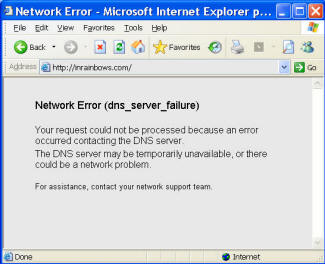eoghan posted on October 04, 2007 14:27
In April 2006 I saw Jane Siberry do a gig in Brussels. I won't labour you with the details but suffice to say she was – at least that night – away with the fairies. It was a terrible, toe-curling fest of an evening, certainly the worst gig of 2006 that I'd seen. But one thing about the night was very memorable. About half way into her set Jane (who was then, and still is, without a record contract) announced she'd be selling copies of her albums after the gig but – and this is where it got memorable - she had no pricelist as she was leaving it to us to decide what we wanted to pay for each CD. Now that was something I'd never heard of before, or since.
 Until this week that is.
Until this week that is.
This week saw Radiohead pull a Jane Siberry, with their announcement that their new album "In Rainbows" is coming out on October 10th and they too are letting fans decide what they want to pay for a download. It's one thing for a briefly acclaimed, bare-footed, earth-loving, new age Canadian chanteuse to do this, it is quite another thing for of the most established bands in the world to do so.
Radiohead have however gone one step further and also provided fans the alternative of buying a 'disc box' (containing the album on both CD and on 2 x vinyl records, lyric booklets and an extra CD containing new songs). The disc box is being sold for UK£40 (approx 58 euros). There's no record label in the loop, this is Radiohead offering the new album – download and disc box versions - direct to their fans with infrastructures they are putting in place themselves.
On many levels this is just the sort of major industry-shaking move I was previously expecting from Radiohead. On the surface they have really delivered – a major established act free of record label contractual chains choosing to allow access to downloads of their new music for whatever a fan is prepared to pay, and backing it up with a pricy deluxe "disc box" for those prepared to dip deeper into their pockets. There are a few important unknowns about the download offering that despite all the brou-hah this week still, as far as I know, need to be cleared up. I'm talking about:
- Are the downloads DRM-free?
- Are they in MP3 format?
- What bit rate will the files be encoded with?
I could find no details on www.inrainbows.com on these points. Nonetheless, for the moment it is one-nil to Radiohead, something though I think could easily change…
See, I've been doing a bit of rummaging about the venture and the more I dig out the more doubts start to rise. Hear me out. The digital component of this release, while not a new idea, has just grown hugely in its potential because of the simple fact that - finally - an act with massive reach have embraced it. However it is not the embracing of an idea that needs to be judged but its execution. And I think there are grounds to fear that the execution of this idea will not go all swimmingly.
To make this happen the most vital thing Radiohead need to ensure is that the www.inrainbows.com website they have set up for fans to download the album / buy the disc box is hosted by a world class (I repeat: world class) hosting company, someone who has the experience and hardneck infrastructure required to run a high profile, intensely trafficked transactional website capable of dealing simultaneously with sudden traffic surges, thousands of visitors and the serving up of potentially tens of thousands of downloads in any given moment. And to do so without a hitch. Without such infrastructure behind it there could be a major meltdown of the website, especially on October 10th when people start downloading the album. And a server meltdown, if it were to happen, would quickly become the story, drowning out the 'shaking-the-music-industry-at-its-roots' line currently all over the blogosphere (and about to infiltrate Mondeo-man's world via this weekend's Sunday newspapers no doubt). If precautions are not taken place this could all backfire spectacularly for Radiohead (in a similar fashion, if not more so, to how in the past U2 got lambasted by fans for website oversights).
So in light of such risks Radiohead will have gone and roped in a world class web hosting company for this, right? Wrong. See, Radiohead have instead decided to give the job to a t-shirt shop.
Okay I'm being facetious. But just a bit.
The www.inrainbows.com website is being hosted by www.sandbag.uk.com, who are principally an online seller of t-shirts for various third parties. Reading between the lines of their 'About us' page Sandbag seems to be a spin off of W.A.S.T.E. (who have been selling Radiohead's merchandise for about 10 years).
Sandbag's main line of business today is setting up and managing similar online merchandise (including ticketing) services for other bands such as Keane, REM and Supergrass. They now also do bit of business on the side in providing basic web hosting services targeted at bands. Now, I've done plenty of research into web hosting companies over the years (with a view to finding the best home for this darned CLUAS site) and I can confidently say there is nothing special in their hosting services. What is clear is that Sandbag's core business is helping bands sell t-shirts and other merchandise online and overseeing the shipping of them to customers. Web hosting is NOT their core business (and not, by extension, their core competency).
Maybe I am wrong and Sandbag have what it takes in terms of infrastructure and employ a battle-hardened dream team of geeks to oversee it. But so far it's not looking good.
How about that Sandbag hosting infrastructure? Well within a day of Radiohead's announcement the www.inrainbows.com site had its first meltdown. And the traffic that caused the meltdown was people just looking for standard web pages with text and pictures and submitting credit card details, not people trying to download weighty MP3s, as they will try to do in their tens of thousands at a time on the site come Oct 10th. Had they done no stress-testing of the server before its launch? You can be sure that such a high profile web site, if it had been hosted with a world class outfit, would have stress-tested it before letting the world know about it.
How about the Sandbag geek team overseeing www.inrainbows.com? They must know what they're doing, even if the infrastructure is not the most robust? Here I also have my serious doubts. Try this for size: at the time of writing (and constantly over the last two days) inrainbows.com as a website does not exist. I repeat: it does not exist. I am serious. Try it out yourself. See what I mean?
 What is happening - as I run the risk of going all abstract - is that to access inrainbows.com you must put the "www." before the domain name to access the site. If you don't, you get an error because, as far as the internet is concerned, inrainbows.com quite literally does not exist. And why? Because whoever is in charge of hosting the website (that'll be sandbag) forgot to make the most elementary of configuration settings to what is called the 'NameServer' (a 'Nameserver' is responsible for directing all domain name requests typed into browsers to the right IP number of the domain, it's like the telephone directory of domain names). This is a very basic thing to do, one that any wannabee web geek will know. Nonetheless the sandbag guys forgot (or did not know?) to do it. Are they really ready for what is about come their way? Such an 'amateur hour' oversight does not raise my confidence.
What is happening - as I run the risk of going all abstract - is that to access inrainbows.com you must put the "www." before the domain name to access the site. If you don't, you get an error because, as far as the internet is concerned, inrainbows.com quite literally does not exist. And why? Because whoever is in charge of hosting the website (that'll be sandbag) forgot to make the most elementary of configuration settings to what is called the 'NameServer' (a 'Nameserver' is responsible for directing all domain name requests typed into browsers to the right IP number of the domain, it's like the telephone directory of domain names). This is a very basic thing to do, one that any wannabee web geek will know. Nonetheless the sandbag guys forgot (or did not know?) to do it. Are they really ready for what is about come their way? Such an 'amateur hour' oversight does not raise my confidence.
What it boils down to is that Radiohead - by declining the option of getting a world class, experienced web hosting company to provide the vital infrastructure required for a venture as bold as this - are greatly increasing the risk of scuppering the whole thing.
Putting it another way, www.inrainbows.com is a dam at genuine risk of bursting on October 10th. Adequate preparation for such a possibility would mean Radiohead having more than a few loosely packed sandbags at their disposal. Excuse me as I stick with the whole dam theme, but - inverting the Dutch legend of Hans Brink who saved Haarlem from a leaking dam with a single digit - Radiohead would do well to get their finger out over the coming week.
More ...
[Read more...]